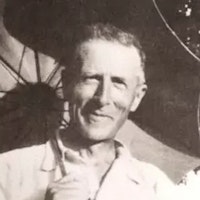By virtue of the Creation and, still more, of the Incarnation, nothing here below is profane for those who know how to see. On the contrary, everything is sacred.
By virtue of the Creation and, still more, of the Incarnation, nothing here below is profane for those who know how to see. On the contrary, everything is sacred.
Pierre Teilhard de Chardin

Everything Is Sacred
Topic: Immanence & Transcendence
By virtue of the Creation and, still more, of the Incarnation, nothing here below is profane for those who know how to see. On the contrary, everything is sacred... Try, with God’s help, to perceive the connection—even physical and natural—which binds your labor with the building of the kingdom of heaven; try to realize that heaven itself smiles upon you and, through your works, draws you to itself.
Pierre Teilhard de Chardin was a French Jesuit priest, paleontologist, theologian, philosopher, and teacher. He was born on May 1, 1881, in Sarcenat, France. He studied geology and paleontology at the University of Paris, and was ordained a priest in 1911.
During World War I, Teilhard served as a stretcher bearer on the front lines. He was decorated for his bravery, and his experiences in the war led him to develop a new understanding of the relationship between science and religion. He believed that evolution was a process of spiritual as well as biological transformation, and that humanity was evolving towards a final spiritual unity. He coined the term "Omega Point" to describe this final spiritual unity.
After the war, Teilhard taught at the Catholic Institute of Paris. He also traveled to China, where he participated in the discovery of Peking Man. In the 1930s, he traveled to other parts of Asia, including the Gobi Desert, Sinkiang, Kashmir, Java, and Burma.
Teilhard's writings were controversial, and he was not allowed to publish his work in the Catholic Church until after his death. However, his ideas have since been published and translated into many languages. His ideas have been praised by some for their insights into the relationship between science and religion, but they have also been criticized by others for being too optimistic or even heretical.
Teilhard de Chardin was a brilliant and passionate thinker, and his work continues to be influential and thought-provoking. He was a pioneer in the field of evolutionary theology, and his ideas have helped to shape the way we think about the relationship between science and religion.
Teilhard de Chardin, Pierre. The Divine Milieu. Harper & Row, 1965, p. 65.

Pierre Teilhard de Chardin
Theme: Intimate Divinity

About This Teilhard de Chardin Quotation [Commentary]
Pierre Teilhard de Chardin teaches that “by virtue of the Creation and, still more, of the Incarnation, nothing here below is profane for those who know how to see.” He insists that “everything is sacred,” not only in holy places but in the whole of existence. Creation itself, and most of all the Incarnation, reveals that God’s presence saturates the world, making even the ordinary holy.
He urges us to “try, with God’s help, to perceive the connection—even physical and natural—which binds your labor with the building of the kingdom of heaven.” Work is not outside of the spiritual life but is joined to it. Teilhard explains that heaven itself “smiles upon you and, through your works, draws you to itself.” In this way, daily efforts and responsibilities become part of a greater communion.
Teilhard reminds us again that “nothing here below is profane” when we learn how to see. Each moment, each action, carries the possibility of revealing the divine. To live in this awareness is to awaken to “the divine milieu,” where our lives and our labors are taken up into the sacred whole. This vision shows us that divinity is not distant but present, drawing us closer in every part of life.
Richard Rohr [CAC] About Teilhard de Chardin
Teilhard writes: “I am not speaking metaphorically when I say that it is throughout the length and breadth and depth of the world in movement that man [sic] can attain the experience and vision of his God.” Teilhard also says: “By means of all created things, without exception, the divine assails us, penetrates us, and molds us. We imagined [the divine] as distant and inaccessible, when in fact we live steeped in its burning layers.”
It was statements such as these, misinterpreted as pantheism or naturalism, which resulted in Church and Jesuit superiors prohibiting Teilhard from publishing his works and even banishing him from living in his French homeland. But they could not make him “abandon my own personal search,” as Teilhard wrote to one of these authorities. “I have ceased to propagate my ideas and am confining myself to achieving a deeper personal insight into them. This attitude has been made easier for me by my now being once more in a position to do first-hand scientific work. . . . You can count on me unreservedly to work for the kingdom of God, which is the one thing I keep before my eyes and the one goal to which science leads me.” For Teilhard, there was no dualistic split between science and religion.
Nor was there a split between human work and spirituality. To explain what he called “the divinization of our activities,” Teilhard wrote, “By virtue of the Creation and, still more, of the Incarnation, nothing here below is profane for those who know how to see. On the contrary, everything is sacred. . . . Try, with God’s help, to perceive the connection—even physical and natural—which binds your labor with the building of the kingdom of heaven; try to realize that heaven itself smiles upon you and, through your works, draws you to itself.”
Resources
Related Quotes
Copyright © 2017 – 2026 LuminaryQuotes.com About Us